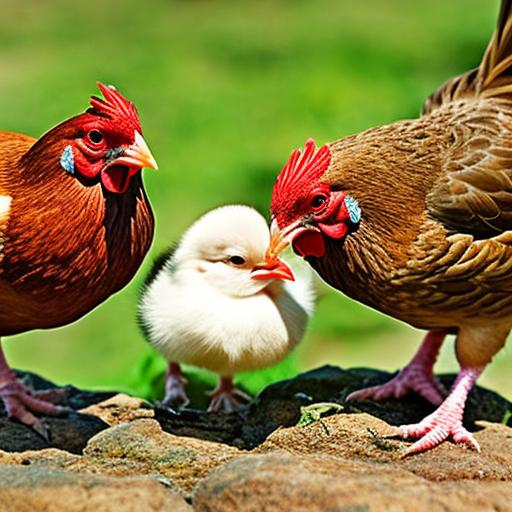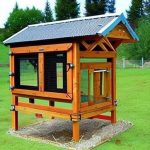Keeping chickens clean and healthy is essential for their overall well-being and productivity. Chickens are naturally clean animals, but it is important for chicken owners to understand their natural behaviors in order to maintain cleanliness in the coop. By providing a clean and well-maintained environment, chicken owners can prevent the spread of disease and ensure the health of their flock.
Key Takeaways
- Keeping chickens clean is important for their health and well-being.
- Understanding natural chicken behaviors can help maintain cleanliness in the coop.
- The chicken coop plays a crucial role in keeping chickens clean.
- Choosing the right type of chicken coop and proper placement is essential.
- Regular cleaning and maintenance practices are necessary to prevent common health issues associated with dirty chicken coops.
The Importance of Keeping Chickens Clean
Keeping chickens clean is crucial for their health and well-being. Dirty chicken coops can lead to a variety of health risks for the birds. Bacteria, parasites, and other pathogens thrive in dirty environments, which can lead to diseases such as coccidiosis, salmonella, and respiratory infections. These diseases can cause significant harm to the chickens and even result in death.
In addition to the health risks, dirty chicken coops can also affect egg production. Chickens that are living in dirty conditions may become stressed, which can lead to a decrease in egg production. Dirty coops can also attract pests such as rats and flies, which can further spread disease and cause harm to the chickens.
Understanding the Natural Behaviors of Chickens
To effectively keep chickens clean, it is important to understand their natural behaviors. Chickens are naturally clean animals and will spend a significant amount of time preening themselves and dust bathing. Preening involves the chickens using their beaks to clean and groom their feathers, while dust bathing is a behavior where they roll around in dust or loose soil to clean their feathers and remove parasites.
However, chickens also have a natural instinct to scratch and peck at the ground. This behavior can lead to the accumulation of dirt, droppings, and other debris in the coop. Understanding these natural behaviors can help chicken owners design their coops in a way that promotes cleanliness and minimizes the accumulation of waste.
The Role of the Chicken Coop in Maintaining Cleanliness
The chicken coop plays a crucial role in maintaining cleanliness and preventing the spread of disease. A clean and well-maintained coop provides a healthy environment for the chickens to live in. It is important to regularly clean the coop and remove any accumulated waste, such as droppings and feathers.
Proper ventilation is also essential in maintaining cleanliness in the coop. Good airflow helps to remove moisture and prevent the buildup of ammonia from chicken waste, which can be harmful to the birds. Adequate ventilation also helps to control temperature and humidity levels, creating a comfortable environment for the chickens.
Choosing the Right Type of Chicken Coop
When it comes to choosing a chicken coop, there are several options available. The type of coop you choose will depend on factors such as the number of chickens you have, the available space, and your personal preferences.
One popular option is a traditional wooden coop. Wooden coops are sturdy and provide good insulation, but they require regular maintenance to prevent rotting and damage from pests. Another option is a plastic or metal coop, which are easier to clean and maintain but may not provide as much insulation.
There are also mobile coops, also known as chicken tractors, which allow you to move the coop around your yard. These coops provide fresh grazing areas for the chickens and help prevent the buildup of waste in one area.
Proper Placement of the Chicken Coop

Proper placement of the chicken coop is essential for maintaining cleanliness. The coop should be placed on a well-drained area to prevent water from pooling inside. It should also be situated away from areas prone to flooding or excessive moisture.
The coop should be placed in an area that receives adequate sunlight, as sunlight helps to kill bacteria and parasites. It is also important to consider predator protection when choosing the location of the coop. The coop should be placed in an area that is secure from predators such as raccoons, foxes, and dogs.
Essential Cleaning and Maintenance Practices for the Chicken Coop
Regular cleaning and maintenance of the chicken coop are essential for keeping chickens clean and healthy. The coop should be cleaned at least once a week, or more frequently if necessary. This involves removing all bedding material, such as straw or wood shavings, and replacing it with fresh bedding.
All surfaces of the coop should be thoroughly cleaned and disinfected to kill any bacteria or parasites. This includes scrubbing the walls, perches, nesting boxes, and any other surfaces that come into contact with the chickens. It is important to use a disinfectant that is safe for chickens and follow the manufacturer’s instructions.
Common Health Issues Associated with Dirty Chicken Coops
Dirty chicken coops can lead to a variety of health issues for the birds. One common health issue is coccidiosis, which is caused by a parasite that thrives in dirty environments. Coccidiosis can cause diarrhea, weight loss, and even death in severe cases.
Another common health issue is respiratory infections. Dust, ammonia, and other airborne particles can irritate the respiratory system of chickens and lead to infections such as infectious bronchitis or mycoplasma gallisepticum.
Dirty coops can also attract pests such as mites, lice, and flies. These pests can cause discomfort for the chickens and spread diseases. Regular cleaning and maintenance practices can help prevent these health issues from occurring.
Tips for Keeping Chickens Clean and Healthy
To keep chickens clean and healthy, there are several tips to keep in mind. First, provide ample space for the chickens to move around and exercise. Overcrowding can lead to stress and an increased risk of disease.
Second, provide clean water and feed for the chickens. Dirty water can harbor bacteria and parasites, while contaminated feed can lead to digestive issues. Regularly clean and refill waterers and feeders to ensure the chickens have access to fresh and clean food and water.
Third, monitor the health of the chickens regularly. Look for signs of illness such as lethargy, loss of appetite, or changes in behavior. If you notice any abnormalities, consult a veterinarian for proper diagnosis and treatment.
Chickens Can Be Clean Animals with Proper Care and Maintenance
In conclusion, keeping chickens clean and healthy is essential for their overall well-being and productivity. By understanding the natural behaviors of chickens and providing a clean and well-maintained coop, chicken owners can prevent the spread of disease and ensure the health of their flock. Regular cleaning and maintenance practices, along with proper placement of the coop, are key in maintaining cleanliness. By following these tips and monitoring the health of the chickens, chicken owners can enjoy a clean and healthy flock.
If you’re considering keeping chickens but have concerns about their cleanliness, you’ll be relieved to know that chickens can actually be quite tidy animals when provided with the right living conditions. In fact, a well-maintained chicken coop can help ensure that your feathered friends stay clean and healthy. To learn more about creating a clean and comfortable environment for your chickens, check out this informative article on poultrywizard.com: Farmhouse Chicken Coop: A Guide to Keeping Your Chickens Clean and Happy. This article provides valuable insights and tips on how to maintain a clean coop that promotes good hygiene for your chickens.
FAQs
What is the natural behavior of chickens?
Chickens are social animals that enjoy scratching and pecking at the ground, dust bathing, and roosting at night. They also lay eggs and forage for food.
Do chickens carry diseases that can be harmful to humans?
Chickens can carry Salmonella, a bacteria that can cause food poisoning in humans. It is important to practice good hygiene when handling chickens and their eggs.
Are chickens messy animals?
Chickens can be messy animals, especially when they are kept in a confined space. They produce droppings that need to be cleaned regularly, and they can kick up dust when they scratch at the ground.
Do chickens smell bad?
Chickens can produce a strong odor, especially if their coop is not cleaned regularly. However, with proper ventilation and cleaning, the smell can be minimized.
What is the best way to keep chickens clean?
Providing a clean and dry living space for chickens is important for their health and hygiene. This includes regularly cleaning their coop, providing fresh bedding, and ensuring they have access to clean water for drinking and bathing.
Can chickens be trained to use a litter box?
Chickens cannot be trained to use a litter box like cats can. However, providing a designated area for them to dust bathe can help keep them clean and reduce the amount of dust in their living space.
Meet Walter, the feathered-friend fanatic of Florida! Nestled in the sunshine state, Walter struts through life with his feathered companions, clucking his way to happiness. With a coop that’s fancier than a five-star hotel, he’s the Don Juan of the chicken world. When he’s not teaching his hens to do the cha-cha, you’ll find him in a heated debate with his prized rooster, Sir Clucks-a-Lot. Walter’s poultry passion is no yolk; he’s the sunny-side-up guy you never knew you needed in your flock of friends!







